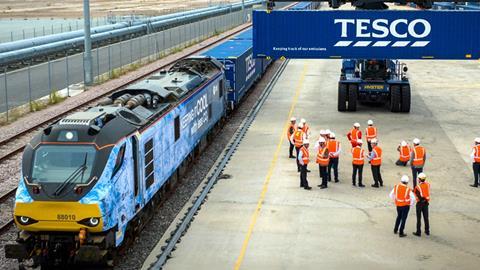Supermarket giant Tesco has launched its tenth rail service this week in partnership with Maritime Transport and Direct Rail Services, in a move which will see the rail service replace 90 lorry journeys a week.
The launch will see another 31 million cases of goods a year moved across the country by Tesco’s rail network, rather than by lorry, as the retailer continues to roll out its rail service across the UK.
The rail service will shift 600,000 cases per week, replacing more than 90 lorry journeys a week that were previously needed to move goods from Tesco’s main distribution centre in Daventry, Northamptonshire on a 260-mile round trip to its regional distribution centre in Widnes in the North West.
Instead, the goods will be brought in by train to Maritime’s rail terminal in Manchester, with Maritime’s fleet completing final-mile deliveries to Tesco’s regional distribution centre and stores in the region.
The retailer said the move will save more than 6,000 tonnes of carbon emissions and brings the total number of cases moved by the Tesco rail network to more than 300 million per year, equating to over 6 million cases per week and increasing to more than 7 million during peak periods.
Tesco said that by delivering by rail to Trafford Park, products are much closer to stores for the final step in the delivery process, with Maritime Transport’s fleet of lorries collecting cases of goods off the train and delivering them direct to store.
The new service will move both fresh and dry goods and bring the number of Tesco stores receiving deliveries by rail to 198.
It will run six times a week from Monday to Saturday, and the retailer is working with its suppliers to ensure that the return leg of the service is used.
Ken Murphy, Tesco Group chief executive, said: “Tesco’s distribution network is one of the most extensive in the UK and plays an important role in our efforts to become carbon neutral in our own operations by 2035.
“Switching from road to rail allows us to get products to our stores in a more sustainable way, by removing thousands of lorry journeys each year and reducing our carbon emissions.”
John Williams, Maritime Group executive chairman, added: “We are pleased to welcome this important new service to our terminal in Manchester, and continue supporting Tesco with final-mile deliveries to its regional distribution centre and store locations in the northwest.
“Tesco’s largest service to date underlines the strategic role of our rail facility in Manchester as a hub for British trade, uniquely placed to offer fast, efficient, low carbon logistics for both international and domestic cargo.”
Other moves by Tesco to reduce road miles includes the introduction of double decker trailers, which the retailer said has resulted in a 40% reduction of truck journeys.
The retailer is also working with its suppliers to help align multiple orders, with Tesco suppliers working together to purchase both legs of a journey, resulting in 50% fewer vehicles required for these trips.
Maritime Transport, which was acquired by Swiss-based global logistics and supply chain provider MEDLOG last month, is playing a central role in Tesco’s shift to rail freight. In October last year the company landed a new three-year contract with Tesco to manage, plan, and execute all rail operations at Tesco’s central distribution hubs within Daventry International Rail Freight Terminal (DIRFT).
Under the new contract, Maritime will oversee the planning of seven daily rail services linking DIRFT with terminals in Mossend, Tilbury, Wentloog, Teesport, and Inverness, whilst completing final-mile road flow operations to distribution centres and Tesco stores in Yorkshire, Middlesbrough, the Midlands, and London.

















